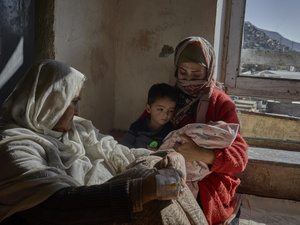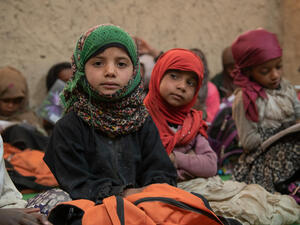UNHCR head calls for urgent political solution to Iraq's deepening crisis
UNHCR head calls for urgent political solution to Iraq's deepening crisis

UN High Commissioner for refugees António Guterres talks with an Iraqi father in Khazair Transit camp in northern Kurdistan who described how he and his family were forced to flee from Mosul
ERBIL, Iraq, 18 July (UNHCR) - UN High Commissioner for Refugees António Guterres warned on Friday that Iraq risks "full-fledged sectarian war and complete fragmentation" as Iraqis continue to flee their homes and minority groups are targeted.
Iraqi politicians and the international community are "running out of time to act," he said.
In high-level talks in Baghdad on Wednesday, he urged leaders to move urgently to a political solution and to "seize this last chance to bring everyone together in a non-sectarian approach. Otherwise, we risk a true sectarian war."
The UNHCR head encouraged regional and global governments to provide support. "Countries with influence also need to constructively work towards a solution," he said. "This is a threat to everybody - nobody is safe."
Guterres witnessed the dire conditions facing some of the more than 650,000 Iraqis displaced by conflict since January. At the Khazair transit camp, midway between the Iraqi cities of Erbil and Mosul, he walked the dusty paths between some 500 tents provided by UNHCR where Iraqi Shiites, Sunnis and others are now living.
A father who fled fighting in Mosul a month ago told Guterres his son had returned to the city last week to check on their house and found it occupied and partly destroyed.
Guterres noted the dramatic impact on the economy and society from the influx of more than 225,000 Syrian refugees and over 300,000 newly displaced Iraqis. He appealed to the international community to "enhance support to the government & people in the Kurdistan region in this very difficult moment."
"The Middle East is in flames," he said. 'Kurdistan represents one of the few stable areas where protection can be granted."
The High Commissioner said a forthcoming $500 million contribution by the Kingdom of Saudi Arabia will help the UN provide critical humanitarian aid to Iraqis. "Others need to come forward to help Kurdistan cope with this terrible challenge," he said.
On Friday, the High Commissioner travelled to the new Arbat refugee camp in the northern city of Sulaymaniyah, now home to more than 3,000 Syrians who fled the civil war. Of almost three million Syrian refugees, 225,000 are in Iraq. Noting the region's stability, Guterres said "without Kurdistan, many people fleeing would have no place to go."
Guterres' visited Iraq to pay respect to the internally displaced, Syrian refugees and their host communities and show solidarity during the Muslim holy month of Ramadan. He spoke of his concerns for all Iraqis, especially minorities, who are at risk.
"Everybody needs to be protected," he said. "Everybody seeking access should be given refuge without discrimination. Everybody deserves to be safe."
He praised the commitment by the president and prime Minister of the Kurdistan Region of Iraq to "maintain a policy of open borders and doors to all people in need of help regardless of ethnicity or religion. This attitude of tolerance and openness has an important symbolic meaning at a time when we need to avoid at all cost a sectarian civil war in Iraq."
He was blunt in assessing what UNHCR and the broader humanitarian community can accomplish. "What we do is minimize suffering. There is no humanitarian solution for this tragic humanitarian crisis. There is no way humanitarians can clean up the mess made by politicians. What they really need is peace."
By Edward Colt and Melissa Fleming









